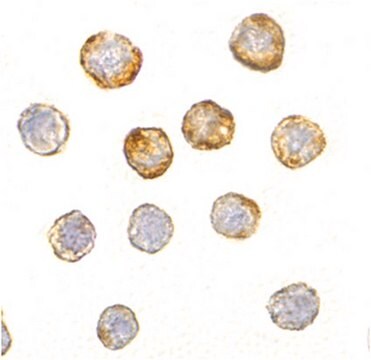ABN469
Anti-DISC1 Antibody
from rabbit, purified by affinity chromatography
Synonym(s):
DISC1 Antibody, Disrupted in schizophrenia 1 protein, KIAA0457
About This Item
Recommended Products
biological source
rabbit
Quality Level
antibody form
affinity isolated antibody
antibody product type
primary antibodies
clone
polyclonal
purified by
affinity chromatography
species reactivity
mouse
species reactivity (predicted by homology)
human (based on 100% sequence homology)
technique(s)
western blot: suitable
UniProt accession no.
shipped in
wet ice
target post-translational modification
unmodified
Gene Information
human ... DISC1(27185)
General description
DICS1 is highly expressed in the dentate gyrus of the hippocampus. It is also expressed in the temporal and parahippocampal cortices and cells of the white matter. Expression rises within the dentate gyrus and temporal cortex from the neonatal period to infancy, declines markedly in adolescence, and declines further with aging. Uniprot describes 8 isoforms ranging between ~37 kDa and ~94 kDa.
Specificity
Immunogen
Application
Neuroscience
Developmental Neuroscience
Quality
Western Blotting Analysis: 2 µg/mL of this antibody detected DISC1 in 15 µg of NIH/3T3 cell lysate.
Target description
Physical form
Storage and Stability
Analysis Note
NIH/3T3 cell lysate
Other Notes
Disclaimer
Not finding the right product?
Try our Product Selector Tool.
Storage Class Code
10 - Combustible liquids
WGK
WGK 1
Certificates of Analysis (COA)
Search for Certificates of Analysis (COA) by entering the products Lot/Batch Number. Lot and Batch Numbers can be found on a product’s label following the words ‘Lot’ or ‘Batch’.
Already Own This Product?
Find documentation for the products that you have recently purchased in the Document Library.
Our team of scientists has experience in all areas of research including Life Science, Material Science, Chemical Synthesis, Chromatography, Analytical and many others.
Contact Technical Service







